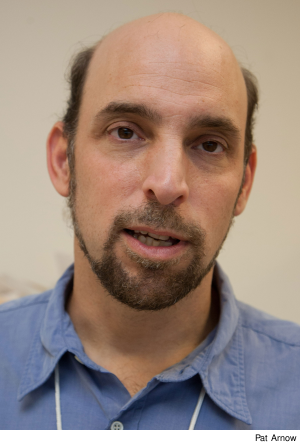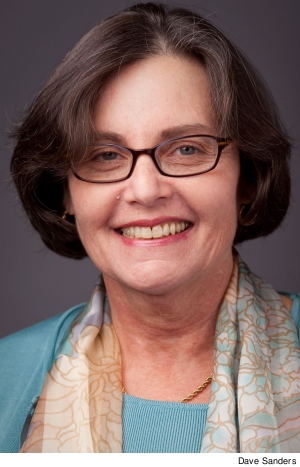A conflict between English department faculty and the administration at Queensborough Community College (QCC) in September, 2012 has grown into a University-wide issue, sparking a new level of resistance by CUNY faculty to the administration’s Pathways initiative.
Pathways, an administration-driven overhaul of CUNY’s rules on general education and transfer, imposes a lower limit for the total number of credits that colleges can require in general education. (Click here for more details.) Pathways has been strongly opposed by the PSC, the University Faculty Senate, and other elected faculty bodies at CUNY, who say that it would diminish the quality of students’ education.
The confrontation at QCC began on September 12 when, despite administration pressure, the English department voted not to approve new Pathways-compliant courses for freshman composition, which would have reduced classroom hours from four to three per week.
FOUR HOURS
At QCC, as at most CUNY colleges, composition courses receive three credits but meet for four hours per week. “Having four hours in class is very important, especially for our students at QCC,” said Susan Jacobowitz, an associate professor of English. “Many are non-native speakers of English, many are coming in through remediation. If we reduce the time we spend on instruction by 25%, many of our students will struggle when they otherwise would have succeeded.”
Jacobowitz’s colleagues agreed, and by a more than two-to-one margin, they voted down the three-hour, three-credit proposal. The QCC administration responded with a blunt threat. “That decision has serious repercussions for the College and the department,” Vice President Karen Steele wrote the next day in an email to the department chair. “Since we don’t have in place courses that will meet the Pathways requirements for the Common Core, we can’t put forward a Fall 2013 schedule that includes English composition courses.” Therefore, she wrote, “we will have to take the following actions:
- • All searches for full-time faculty in the English department will be cancelled immediately…;
- • of necessity, all adjunct faculty in the English department will be sent letters of non-reappointment for Fall 2013; and
- • the reappointment of full-time faculty in the English Department will be subject to ability to pay and Fall ’13 enrollment in department courses.”
QCC students would be advised to take composition at another CUNY college, Steele added.
It was a heavy-handed move, and it backfired: the effect of Steele’s threats was to stir up stronger opposition to Pathways than ever before.
The PSC responded to this threat to its members’ jobs with a statement the next day. The union said it was “outrageous” that faculty members would be threatened with reprisals for voting according to their professional judgment on a matter of curriculum. “The vice president’s extraordinary retaliation threatens the most basic understandings of both academic freedom and faculty authority,” the union said. “Every faculty member should know that the union is here to defend your rights,” it added, noting that the PSC was prepared to take legal action if necessary.
“There is no reason for the administration to eliminate English composition courses, or any other courses, that do not comply with Pathways,” the union emphasized. “They will still fulfill the college’s degree requirements. Such courses could still transfer to other colleges for credit outside the general education curriculum.” Eliminating all composition courses was not only unnecessary, the PSC said, it could violate State Education Department regulations and jeopardize QCC’s accreditation.
DISCIPLINE COUNCIL
A couple of days later, CUNY’s English Discipline Council (EDC), made up of chairs and representatives from English departments across the University, spoke out in solidarity with their colleagues. “The English department faculty’s understanding of student needs should be respected at Queensborough and at all the CUNY colleges,” the EDC wrote to Alexandra Logue, CUNY’s Executive Vice Chancellor and University Provost. “We write to condemn the Queensborough Community College Administration’s violation of faculty governance and call for an unequivocal reversal of all threats against its faculty and students.”
The University Faculty Senate (UFS) also weighed in with a statement by its Executive Committee. “Unfortunately the situation at Queensborough, while more public, is not unique,” UFS leaders observed. “At other campuses threats and intimidation with regard to Pathways have also taken place.” QCC’s English faculty were “making an academic judgment that they are uniquely qualified to make,” the UFS emphasized. Responding to intellectual disagreement with raw threats is an “abuse of authority,” it concluded, and must be rejected. And the American Association of University Professors warned Chancellor Matthew Goldstein that an “inhospitable climate for academic freedom” must not be allowed to develop at QCC. In response to the storm of protest, the QCC administration beat a partial retreat. In a campus-wide e-mail on September 16,2012,the college’s interim president, Diane Call, set a different tone. “The potential consequences as described in Vice President Steele’s e-mail illustrate the worst case scenario – one we are prepared to work mightily to avoid,” she wrote. Call’s e-mail did not quiet the growing protests, however, and on September 18,2012, Steele issued a public apology.
Faculty leaders welcomed the change in tone. “An apology, however, is not a retraction,” the PSC emphasized on September 18, 2012. “Damage has already been done,” it continued. “At a minimum, it is time for a moratorium on implementation of Pathways, to allow academic freedom and open deliberation at CUNY to be repaired. The PSC calls on the CUNY administration to suspend all implementation of Pathways until at least the end of the current semester, so that this important curriculum change can receive the free and open consideration it deserves.”
The controversy burst into the news media, with headlines like “College English Dept. Fights Class-Time Cuts,” and “Teachers Fight New CUNY Program.” There was coverage in The New York Times, the Daily News, The Chronicle of Higher Education, Inside Higher Ed, public radio, and more. The clear position taken by QCC English faculty – that they would not agree to spend less time with their students, even in the face of threats – attracted reporters’ attention and the sympathy of the public.
“It’s hard to understand how teaching less English, less math, less science and less foreign languages could be good for students,” David Humphries, the department’s deputy chair, told The New York Times. “Under the guise of streamlining transferability we’re actually watering down the students’ education.”
CUNY’s conflict over Pathways had “reached a boiling point,” WNYC host Brian Lehrer told listeners. His guest, Scott Jaschik of Inside Higher Ed, said that even some supporters of Pathways had been “very disturbed” by the administration’s response. On-air discussion touched on a point that the PSC raised in its September 18, 2012 statement: “The resort to threats exposes the fear that the Pathways curriculum would not be approved without them.”
The effect on those curriculum votes was where management may have made its biggest miscalculation. The confrontation at Queensborough appeared to have left faculty more, not less, willing to vote down Pathways-compliant courses.
UNITED
At the behest of QCC’s administration, the college’s English department met again the week after its initial vote – and did not change its position. The same week, the English department at LaGuardia Community College rejected a proposal for three-hour composition classes, and voted to stand by the four-hour course plan it had followed for years. It reaffirmed that stance in a near-unanimous vote on October 10, despite severe pressure from LaGuardia’s administration. Bronx Community College’s (BCC) English department continued to resist pressure to change the four-hour composition course approved by BCC’s curriculum committee in April 2012, with the backing of BCC’s Faculty Council.
English departments at Borough of Manhattan Community College and Hostos Community College, do not have this fourth hour of instruction for composition – but BMCC is now seeking it.
“We need that time with our students as well,” said Craig Bernardini, chair of the Hostos English department, who emphasized the issue when he stood for election as department chair.
 |
Dozens of faculty from English departments at CUNY community colleges attended an emergency meeting at the PSC on October 3, 2012, to discuss a collective response to the threats they have received from management. Union leaders reiterated the PSC’s commitment to defend members from retaliation and outlined the contractual and legal basis for the faculty’s right to exercise their academic judgment in voting on curriculum matters. It was very much a working meeting, with colleagues from different colleges sharing information and comparing notes on their administrations’ tactics.
 |
“I was inspired by the commitment of both senior and junior colleagues to resist administration threats and pressures, and to maintain a united stand,” Anne Friedman, PSC vice president for community colleges, said afterwards.
PRESSURE
English faculty from several community colleges said they had been pressured to accept a “deal,” in which they would get four hours’ workload credit for teaching a three-hour composition class with an additional “conference hour.” But student attendance in that fourth hour would not be mandatory, and faculty would not be allowed to meet with the entire class at once. “In other words, it would not be a classroom hour,” said QCC’s Jacobowitz. “And a fourth classroom hour with all our students – not just some of them – is what we need.” She noted that senior college English departments were being allowed to continue with four-hour composition classes. “So our students, many of whom need this instruction more, will be given less,” Jacobowitz said. “It makes no sense.”
Others said they had been assured that the proposed three-hour composition classes would have fewer students, to compensate for the reduction in class time. But they noted that unless such limits were negotiated through the union and incorporated into the collective bargaining agreement, they would be unenforceable. “Next year will come and they’ll tell you, ‘Oh, our budget’s been cut, so we have to raise your class size. We have no choice.’ If it’s not in the contract, what are you going to do?” said one participant.
MORATORIUM
When QCC’s Academic Senate, which includes both faculty and administration representatives, met on October 10,2012, it approved two resolutions that gave further support to its English department’s stand. The first affirmed that QCC must continue to offer the courses required for its degree programs – a stance that would prevent the college from dropping its composition courses. The second declared a moratorium on review of Pathways-compliant courses until the QCC administration’s earlier threats are formally retracted, and the administration affirms in writing “that the academic judgment and academic freedom of the faculty will be upheld without reprisal.”
______________________________
RELATED COVERAGE:
‘We Will Not Stand for Threats and Coercion’
PSC Calls for Time-Out on Pathways: ‘Reset’ Needed on Discussion
CUNY English Departments Condemn Threats at QCC
UFS on Faculty Rights

